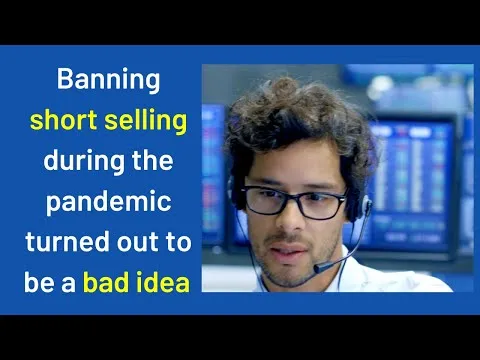
We'd Better Listen to Cassandra Also in Times of COVID
A rule that banned short-selling on the stock exchanges of France, Italy, Spain, Austria, Greece and Belgium at the height of the COVID-19 pandemic in Europe backfired, according to research by Marco Ventoruzzo (Bocconi Department of Legal Studies) and Gianfranco Siciliano (China Europe International Business School) across 15 European countries. "Banning short-selling is associated with lower stock liquidity, higher information asymmetry, and lower abnormal returns as compared with not banning short-selling, thus leading to the exact outcome that these restrictions aim to prevent," Professor Ventoruzzo summarizes.
Short-selling is a widespread practice for investors with bearish expectations. They borrow a security they don't own and sell it on the market, planning to buy it back later, hopefully at a lower price. "On average, in most markets," the authors write, "short-sellers account for roughly more than 20% of trading volume and are generally regarded as traders with access to value-relevant information. This quantitative data suggests that they play an important role in price formation, and according to some analyses they contribute to price discovery by improving information efficiency and possibly market liquidity, while decreasing information asymmetry."
On the other hand, when combined with the fast diffusion of information and with the automatic reactions triggered by trading algorithms based on price movements, short-selling could spark a downward feedback loop, working as a self-fulfilling prophecy, Thus, bans are common in times of crisis. "Bans have been viewed by some as a necessary regulatory intervention to ensure financial stability, a sort of circuit breaker," Professor Ventoruzzo says.
During the financial crisis that followed the outbreak of COVID-19 in Europe, authorities banned short-selling in six EU countries for two months (18 March-18 May 2020), plus a couple of one-day bans for a few stocks. This allows for a comparison both between the behavior of the same stock in normal and banned times and between the markets of countries that did or did not implement the ban.
Analyzing the markets of 14 EU countries plus the UK from 24 January until 18 May, Professor Ventoruzzo and Professor Siciliano find that information asymmetry is higher during the ban period, that banned stocks are subject to more intense downward pressures, and that market liquidity is slightly lower on banned days.
In particular, the bid-ask spread, a measure of information asymmetry, increases by 16% on banning days, banned stocks underperform non-banned ones by 0.1% per day, and the liquidity of banned stocks decreases by 0.1%. The effects are more intense for financial vs. non-financial stocks.
The results add to mounting evidence of short-selling bans' ineffectiveness and suggest that their implementation could be mainly due to political pressures to "do something" in times of crisis.
Gianfranco Siciliano, Marco Ventoruzzo, "Banning Cassandra from the Market? An Empirical Analysis of Short-Selling Bans during the Covid 19 Crisis", ECGI Working Paper Series in Law, N, 532/2020.
Why COVID Doesn’t Justify Short-Selling Bans
